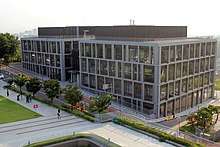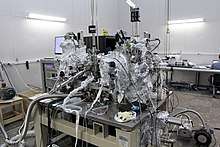Center for Quantum Nanoscience
The Center for Quantum Nanoscience was founded in 2017 as part of efforts for South Korea to expand basic science research. Classified as an Extramural Center of the Institute for Basic Science, it is hosted by Ewha Womans University in Seoul, South Korea. Their research focuses on exploring quantum properties of atoms and molecules on surfaces and interfaces and long-term goals of quantum sensing and quantum computation in those areas.
 | |
| Established | 1 January 2017 |
|---|---|
| Research type | Basic science |
Field of research | Quantum nanoscience, scanning tunneling microscope, quantum technology, nanoscience |
| Director | Andreas J. Heinrich |
| Address | 52 Ewhayeodae-gil, Daehyeon-dong, Seodaemun-gu |
| Location | Seoul, South Korea |
Zip code | 03760 |
| Campus | Ewha Womans University |
Operating agency | Institute for Basic Science |
| Website | qns |
| Center for Quantum Nanoscience | |
| Hangul | |
|---|---|
| Hanja | |
| Revised Romanization | Yangjananogwahak Yeongudan |
| McCune–Reischauer | Yangchananokwahak Yŏnkutan |
Their dedicated building started construction in 2018 and officially opened in 2019[1][2] during the IBS Conference on Quantum Nanoscience.[3]
Research results
Within two years of their founding, several published outcomes indicate growing leadership in the exploding field of quantum nanoscience. For example, they reduced digital memory down to a single holmium atom on MgO substrate using a scanning tunneling microscope.[4][5] At time of their publishing, commercially-available magnetic memory devices require approximately one million atoms to record the same amount of data. This storage miniaturization has additional potential to serve as the basis of quantum computing.[4] Researchers also coupled atom's nuclear spin and its electron counterpart, which resulted in measuring the nuclear spin of single atoms of iron and titanium with an improvement of energy resolution by a fact of 10,000. This level of control could lead to a computational base unit of quantum computing.[6]
Working in collaboration with IBM Almaden, they were able to perform MRI scans on individual atoms.[7][8]
Research directions and goals
The center has stated their desire to achieve full control of quantum states of atoms and molecules on clean surfaces and near interfaces which would allow usage of high-sensitivity quantum sensors and the usage of single atoms and molecules as quantum bits for computation applications. Another goal is to create a theoretical framework on how the quantum properties of atoms and molecules change from gas to solid-state environments and their interactions with conduction electrons and understand the transition from coherent quantum to more classical systems while in solid-state environment.[9]
The research center also hosted the first international conference on quantum nanoscience in Seoul in 2019.[10][11]
Awards
- 2018: American Physical Society, Joseph F. Keithley Award for Advances in Measurement Science[12]
- 2018: Foresight Institute Feynman Prize: For advances in manipulating atoms and small molecules on surfaces and employing them for data storage and computation[13]
- 2018: Outstanding National R&D Performances in 2018 (국가연구개발 우수성과 100선), Ministry of Science and ICT[14][15][16]
- 2018: Max-Auwaerter Award, Austrian Physical Society - Fabio Donati[17][18]
See also
- Kuk Young, former team leader
- Centre for Quantum Technologies
- Michelle Simmons, director of the Centre of Excellence for Quantum Computer Technology
References
- "Center for Quantum Nanoscience Groundbreaking Ceremony at Ewha Womans University". Institute for Basic Science. 25 April 2018. Retrieved 16 May 2018.
The Center for Quantum Nanoscience at the Institute for Basic Science (Director Andreas Heinrich) will have a revolutionary new research space. The Research Collaboration Building (tentatively named) to be constructed by February 2019 at Ewha Womans University will be the new home of the Center.
- "QNS State-of-the-Art Research Facility". Center for Quantum Nanoscience. Archived from the original on 22 March 2019. Retrieved 16 May 2018.
- "Conference Schedule: QNS Dedication Ceremony". IBS Conference on Quantum Nanoscience. Center for Quantum Nanoscience. Retrieved 18 September 2019.
- Natterer, Fabian D.; Yang, Kai; Paul, William; Willke, Philip; Choi, Taeyoung; Greber, Thomas; Heinrich, Andreas J.; Lutz, Christopher P. (8 March 2017). "Reading and Writing Single Atom Magnets". Nature. 543 (7644): 226–228. arXiv:1607.03977. Bibcode:2017Natur.543..226N. doi:10.1038/nature21371.
- "Reading and Writing Single Atom Magnets". Center For Quantum Nanoscience. Retrieved 22 March 2019.
- Bae, Yujeong; Yang, Kai; Lado, Jose; Ferrón, Alejandro; Choi, Taeyoung; Ardavan, Arzhang; Fernández-Rossier, Joaquín; Heinrich, Andreas; Lutz, Christopher (19 October 2018). "Hyperfine interaction of individual atoms on a surface" (PDF). Science. 362 (6412): 336–339. doi:10.1126/science.aat7047. hdl:10045/86495. PMID 30337408.
- Willke, Philip; Yang, Kai; Bae, Yujeong; Heinrich, Andreas J.; Lutz, Christopher P. (1 July 2019). "Magnetic resonance imaging of single atoms on a surface". Nature Physics. 15 (10): 1005–1010. arXiv:1807.08944. doi:10.1038/s41567-019-0573-x.
- Sheikh, Knvul (1 July 2019). "Scientists Took an M.R.I. Scan of an Atom". The New York Times. Retrieved 5 July 2019.
- "Center for Quantum Nanoscience". Institute for Basic Science. Retrieved 11 March 2019.
- Phark, Soo-Hyon; Heinrich, Andreas. "양자나노과학연구단" [Center for Quantum Nanoscience] (PDF). 물리학과 첨단기술 (in Korean). Korean Physical Society. p. 11. doi:10.3938/PhiT.27.028. Retrieved 11 March 2019.
- IBS Conference on Quantum Nanoscience. IBS Conference on Quantum Nanoscience. Ewha Womans University, Seoul, South Korea. 25–27 September 2019. Retrieved 11 March 2019.
- "2018 Stanley Corrsin Award Recipient". www.aps.org. Retrieved 2019-03-22.
- "2018 Foresight Institute Feynman Prize". foresight.org. Retrieved 2019-03-22.
- "Andreas Heinrich Awarded Prize from the Minister of Science and ICT for the Smallest Memory Storage Unit in the World". Center for Quantum Nanoscience. 9 January 2019. Retrieved 18 February 2019.
- 김, 민아 (11 October 2018). "이화여대 연구자, 국가연구개발 우수성과 100선 선정". 천지일보. Retrieved 18 February 2019.
- "Three IBS Centers Listed on "Outstanding National R&D Performances in 2018"". Institute for Basic Science. 25 October 2018. Retrieved 18 February 2019.
- "Winners of the OePG Awards 2018". Austrian Physical Society. Retrieved 11 March 2019.
- "68th Annual Meeting of the Austrian Physical Society" (PDF). 68th Annual Meeting of the Austrian Physical Society Program and Abstracts. Institute of Experimental Physics, Graz University of Technology. 10–13 September 2018. p. 145.
